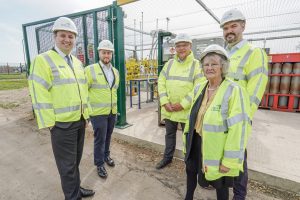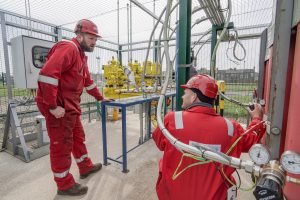A pioneering energy project to gather vital evidence about the suitability of the existing gas network to transport hydrogen is underway in the South Bank area of Teesside.
Northern Gas Networks (NGN) is using a network of existing natural gas mains to carry out standard gas operational procedures under 100% hydrogen conditions for the first time.
The testing is taking place on an area of disused land where gas pipes that once supplied homes on the site, while all still intact, are disconnected from the rest of the network.
The evidence gathered will be used to understand any changes needed for the potential conversion of the gas distribution network to transport clean burning hydrogen in the future.
The UK has set a target of achieving Net Zero carbon emissions by 2050 to help reverse the impact of climate change. The natural gas used by the 85% of homes connected to the gas grid is responsible for over 30% of the UK’s carbon emissions, but hydrogen produces no carbon when burned, so could provide a greener energy solution for heating and cooking.
The South Bank research is part of the H21 project, a major collaborative UK gas industry hydrogen programme led by NGN, to assess the suitability of the UK’s existing gas network to carry hydrogen.
A hydrogen-fuelled gas network would make use of the vast assets which already deliver a safe, resilient and reliable source of heat the nation’s homes and businesses. A hydrogen conversion would be conducted in a similar way to the natural gas conversion of the 1960s and 70s with customers required to change gas appliances, such as boilers and cookers in their homes to similar hydrogen versions, which would work with existing radiators.
The test site, located between Ann Street and Harcourt Road, was chosen because around 70 homes were demolished on the land over a decade ago.
Neil Travers, H21 Project Manager for Northern Gas Networks said: “There are many different procedures carried out on the gas network on a day to day basis and it’s essential we understand how these may need to be adapted to ensure hydrogen can be delivered as safely and reliably as natural gas. Extensive research has already been completed off-grid but the difference at the South Bank is that we are using older gas mains, as are typical in many streets across the UK, for the first time. We believe this is a world first and we’re delighted to be in Teesside where there are already plans for hydrogen production and the potential of a wider hydrogen economy.
In addition to testing network procedures, the project includes the installation of two domestic hydrogen boilers. Produced by leading manufacturers, Vaillant and Baxi the boilers have been connected to the network, and use hydrogen, which has been odourised to smell the same as natural gas for the first time.
Neil Travers, added ‘Natural gas, just like hydrogen, is odourless, so a distinct and widely recognised odour is added to warn everyone of a potential gas leak. Following decades of familiarising the public with the distinct smell of natural gas it is expected that, if hydrogen is widely used in the gas network, it will be odourised in the same way. It’s really exciting that this is another world first for Teesside as part of this project’
Tees Valley Mayor Ben Houchen said: “Teesside has firmly established itself as the go-to place to develop ground-breaking net zero technology, and this research by Northern Gas Networks is yet another in the long list of innovative projects that are putting our region at the forefront of development of cleaner, healthier and safer industries of the future. We’ve long been a leader in hydrogen, already producing over 50% of the UK’s hydrogen supply and pushing forward research and development into rollout of hydrogen vehicles, so this project is building even further on local knowledge and expertise.
“Across Teesside, Darlington and Hartlepool, we’re getting on with delivering on our net zero ambitions through world-leading projects just like this, delivering thousands of good-quality jobs for local workers in the process.”
Mary Lanigan, Leader of Redcar & Cleveland Borough Council, said: “This is hugely exciting and, once again, places our borough right at the hub of the green industrial revolution. This research has huge potential and it is wonderful that we are right there at the beginning. I want to congratulate NGN for developing this test which will gain international attention.”
Jacob Young, Conservative MP for Redcar: “This world-leading trial from Northern Gas Networks is putting Redcar on the map as a true pioneer for hydrogen. It’s still the case that 85% of homes are connected to the gas network, but it is clear that the future lies in switching our gas network to 100% hydrogen.
“Teesside is clearly the epicentre for new hydrogen technologies in the UK, and it’s fitting that our part of the world, which was at the forefront of the first Industrial Revolution, should lead our Green Industrial Revolution too.”
NGN will now spend several months using the site to gather evidence and further understanding potential conversion of the gas network. Once the work is complete, NGN will restore the site to its former state.

Dated: 22/04/2022
Tees Valley Mayor Ben Houchen, Mary Lanigan, leader of Redcar and Cleveland Borough Council and Redcar MP Jacob young pictured with Russ Oxley and Neil Travers from Northern Gas Networks at the research site in the South Bank

-ENDS –
NGN notes to editors
1.NGN started operating in 2005 and has been leading the way as one of the most cost-efficient of the UK’s eight gas distribution networks. NGN delivers great value for money to customers, as well as a whole host of social and economic benefits to the region. NGN is recognised as a dynamic, passionate, conscious and people focused team that safely and reliably delivers gas to over 2.7 million homes and businesses across the North East, northern Cumbria and much of Yorkshire.
2.NGN is leading H21, the gas industry’s flagship suite of projects funded by Ofgem, to demonstrate that the existing gas network can be repurposed to carry hydrogen. After proving that it is technically possible and economically viable for the gas network to transport hydrogen, the H21 project is currently examining the safety implications of a hydrogen gas network. The next phase of the project will demonstrate how gas distribution companies would manage the network and the conversion to 100% hydrogen safely. Tests will be carried out on a gas microgrid at RAF Spadeadam, and on an unoccupied live network in the South Bank area of Middlesbrough.
3.NGN is a partner in HyDeploy, a project to blend 20% hydrogen into the existing gas supply with no changes required in customer homes. Following a successful demonstration on a private network at Keele University 670 properties in Winlaton, Gateshead are currently using a hydrogen blend.
4. NGN is built the UK’s first homes to demonstrate 100% hydrogen appliances to the public in partnership with Cadent Gas and the Government’s Department of Business, Energy and Industrial Strategy (BEIS). The semi-detached houses, which are open to the public are based at NGN’s Low Thornley site near Gateshead and include hydrogen bookers, boilers, fires and even a barbecue.




